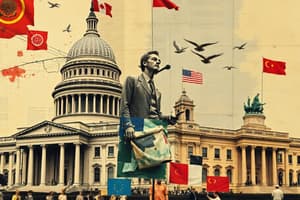Podcast
Questions and Answers
What characterizes a market economy?
What characterizes a market economy?
- Prices are controlled by the government.
- Goods and services are exchanged in a largely free manner. (correct)
- Production is managed by a central authority.
- All economic decisions are made by corporations.
Which of the following is NOT a common cause of market failures?
Which of the following is NOT a common cause of market failures?
- Government oversight (correct)
- Imperfect information
- Externalities
- Monopolies
What does neoliberalism advocate regarding government involvement in the economy?
What does neoliberalism advocate regarding government involvement in the economy?
- Implementation of strict regulations on market practices.
- Greater tax funding for social programs.
- An increase in government intervention.
- A balanced budget and minimized government role. (correct)
Which of the following describes means-tested public assistance?
Which of the following describes means-tested public assistance?
What is foreign direct investment?
What is foreign direct investment?
What is the primary benefit of recognizing ethnocultural identities within political institutions?
What is the primary benefit of recognizing ethnocultural identities within political institutions?
What is a significant consequence of recognizing group rights in a political system?
What is a significant consequence of recognizing group rights in a political system?
In a parliamentary form of government, who serves as the head of government?
In a parliamentary form of government, who serves as the head of government?
What is the primary function of a Vote of No Confidence?
What is the primary function of a Vote of No Confidence?
What factor can lead to military coups according to the provided explanations?
What factor can lead to military coups according to the provided explanations?
What is a key characteristic distinguishing a revolution from a military coup?
What is a key characteristic distinguishing a revolution from a military coup?
What is a common outcome of civil wars in multi-ethnic communities regarding democratization?
What is a common outcome of civil wars in multi-ethnic communities regarding democratization?
Which of the following statements about personal coups is accurate?
Which of the following statements about personal coups is accurate?
Flashcards
Multicultural Integration
Multicultural Integration
Recognizing and accommodating different ethnic/cultural groups within a political system.
Vote of No Confidence
Vote of No Confidence
A parliamentary vote to remove a government (Prime Minister and cabinet) from power.
Coup d’état
Coup d’état
Forceful removal of a regime and establishment of a new one, often by the military.
Revolution
Revolution
Signup and view all the flashcards
Unitary System
Unitary System
Signup and view all the flashcards
Federal System
Federal System
Signup and view all the flashcards
Presidential System
Presidential System
Signup and view all the flashcards
Parliamentary System
Parliamentary System
Signup and view all the flashcards
Market Economy
Market Economy
Signup and view all the flashcards
Command Economy
Command Economy
Signup and view all the flashcards
Market Failure
Market Failure
Signup and view all the flashcards
Universal Entitlements
Universal Entitlements
Signup and view all the flashcards
Means-tested public assistance
Means-tested public assistance
Signup and view all the flashcards
Study Notes
Chapter 4-8: Multicultural Integration
- Ethnocultural identities must be recognized and accommodated within political institutions.
- Recognizing groups helps preserve distinct cultures and improves socioeconomic status.
- Recognizing group rights can lead to disintegration if it undermines national identity and shared values.
- Presidential governments have a president as the head of state and government.
- Parliamentary governments have a prime minister as the head of state and government.
- Vote of no confidence is a process where parliament votes to remove a government.
- Unitary systems have a central government with sole constitutional power.
- Federal systems divide power constitutionally among multiple levels of government.
Chapter 9: Coup d'État
- A coup d'état is a forceful removal of a regime and establishment of a new one.
- Democracies and highly institutionalized regimes are less likely to experience a coup because military is controlled by civilians.
- Coups occur when military efforts to remain loyal to a regime fail.
- This can be due to weak institutions, political cultures not valuing nonmilitary power transfers, and military seeking own interests.
- Coups often result in personalist regimes with less institutionalization.
Revolution
- A revolution involves fundamental regime and social change, often from below.
- It is much rarer than a coup.
- Political outcomes can vary in revolutions, including the possibility of democracy.
Chapter 10: Market Economy
- A market economy involves individuals and firms exchanging goods and services in a largely free manner.
- A command economy is where prices, property, and production are controlled by the state.
- Market failures can occur when markets don't perform efficiently due to externalities, imperfect information, or monopolies.
Chapter 10: Neoliberalism and Keynesianism
- Neoliberalism promotes government balancing its budget and minimizing role in the economy.
- It rejects Keynesian policies.
- Keynesianism suggests government intervention can manage business cycles through fiscal and monetary policy.
Chapter 11: Foreign Direct Investment
- Foreign Direct Investment is investment from abroad in productive activity in another country.
- International Capital Flows are movements of capital money across international borders
Chapter 12: Universal Entitlements
- Universal Entitlements are benefits provided to all citizens, typically funded through general taxation.
- Examples include public education.
Means-Tested Public Assistance
- Means-tested public assistance programs provide benefits to individuals below a specific income level.
- Examples include child/family allowances, Supplementary Nutrition Assistance Program (SNAP), and Temporary Assistance to Needy Families (TANF).
Studying That Suits You
Use AI to generate personalized quizzes and flashcards to suit your learning preferences.




